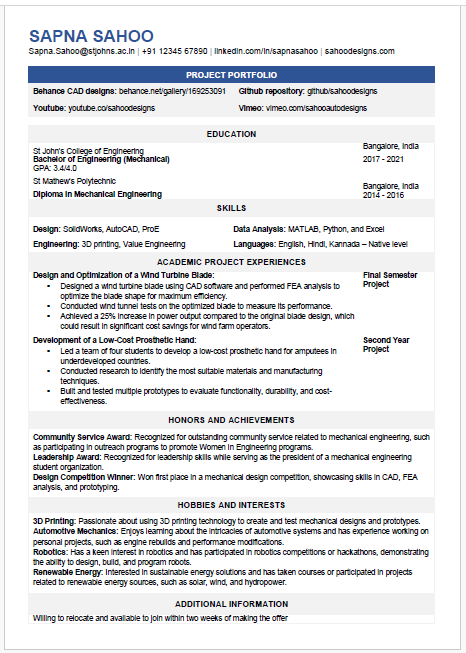Mechanical Engineer
Bachelor of Engineering (Mechanical)

About this template
This is a well-designed resume which can make a significant difference in capturing the attention of hiring managers and landing your dream job.
This resume is made by MS Word, featuring a clean and modern layout designed to highlight your skills and achievements.
Some Important technical skills for mechanical engineer
For mechanical engineers, possessing a diverse range of technical skills is essential for designing, analyzing, and manufacturing mechanical systems. Here are ten important technical skills:
1. CAD Software Proficiency:
Expertise in Computer-Aided Design (CAD) software like AutoCAD or SolidWorks is crucial for creating detailed 2D and 3D models of mechanical components. These tools are essential for drafting, designing, and visualizing engineering projects.
2. Thermodynamics Knowledge:
A strong understanding of thermodynamics is important for analyzing heat transfer, energy conversion, and system efficiencies. This knowledge helps in designing systems that efficiently use and transfer thermal energy.
3. Mechanical Systems Design:
Skills in mechanical systems design involve creating and optimizing components and assemblies. This includes understanding materials, mechanics, and manufacturing processes to design functional and reliable systems.
4. Finite Element Analysis (FEA):
Proficiency in Finite Element Analysis (FEA) software like ANSYS or Abaqus is essential for simulating and analyzing the behavior of mechanical components under various conditions. FEA helps in predicting stress, strain, and deformation.
5. Manufacturing Processes:
Knowledge of various manufacturing processes, such as machining, welding, and casting, is important for selecting appropriate methods and ensuring the quality and feasibility of designs. This includes understanding process parameters and material properties.
6. Mechanical Testing and Measurement:
Skills in mechanical testing and measurement involve using tools and techniques to evaluate the performance and properties of materials and components. This includes understanding instrumentation, calibration, and data analysis.
7. Fluid Mechanics:
An understanding of fluid mechanics is crucial for analyzing fluid flow, pressure, and interactions within mechanical systems. This knowledge is essential for designing hydraulic and pneumatic systems, as well as HVAC systems.
8. Control Systems:
Familiarity with control systems and automation technologies is important for designing and implementing control strategies for mechanical systems. This includes understanding sensors, actuators, and control algorithms.
9. Project Management:
Skills in project management are necessary for planning, coordinating, and executing engineering projects. This includes budgeting, scheduling, and resource management to ensure timely and successful project completion.
10. Material Science:
Knowledge of material science involves understanding the properties and behaviors of different materials. This helps in selecting suitable materials for specific applications and ensuring that designs meet strength, durability, and performance requirements.
Conclusion:
These technical skills enable mechanical engineers to effectively design, analyze, and optimize mechanical systems, ensuring their functionality, efficiency, and reliability in various applications.